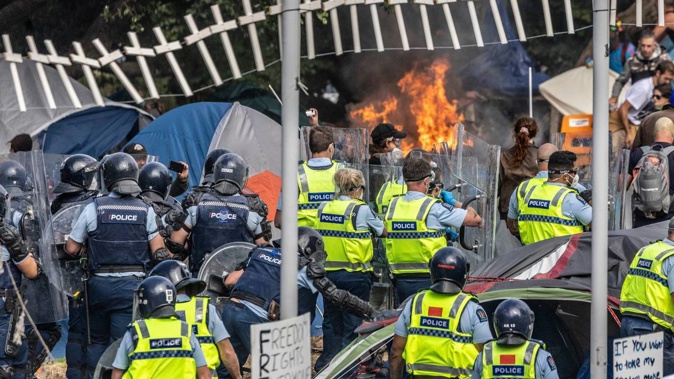
Police spent $3.7 million responding to the occupation at Parliament in February that also saw more than 150 officers injured, official documents show.
The 23-day occupation, which ended with a riot on March 3, was originally reported to have cost just over $2.5 million, but new documents show it was significantly more.
It began with a convoy from around the country and developed into anti-mandate protesters setting up a "village" on Parliament grounds, refusing to leave despite being trespassed.
The protest came to a fiery end with blazes being set amid the camp and police moving in to clear the area.
They were met with violent resistance, with rioters throwing bricks and pavers, badly injuring some officers.
Other items thrown included "potential bodily fluids", milk and a "liquid that caused a burning sensation" according to the report.
The new information from police, released to the Herald after an Official Information Request (OIA) from 1 News, shows more than $1m was spent on accommodation alone.
Between February 9 and March 13, 2309 staff contributed to cover the protest, including 417 officers from Auckland.
Another $1m was spent on staff expense claims, and hundreds of thousands more were spent on travel and food.
/cloudfront-ap-southeast-2.images.arcpublishing.com/nzme/DDRTZCTCTUIVOT6A5KYDR4Y2QY.jpg)
- Parliament protest leader Brian Tamaki says group not planning occupation
- Parliament protest: Council staff to work from home, convoy to descend on capital
Police officers injured. Photo / Mark Mitchell
Half a million was spent on hiring equipment.
The Herald earlier reported more than a third of the police staff involved in the riots were referred to support services to help deal with the emotional toll of the experience.
"Police are members of the public as well," said Wellington Area Commander Inspector Dean Silvester earlier said.
"Having to balance the challenges of working in an environment such as that with your everyday life, having that repeating every day, the same sort of thing, can take its toll," he said.
Information released under the OIA showed 35 staff were referred to psychologists, and more than 750 had been referred to wellness advisers as of the end of May.
Wellness advisers provide support to police staff across the country and have a background in triage. They are registered social workers, nurses, occupational therapists and counsellors.
Police staff suffered 154 injuries over the course of the protest, 47 of which required medical attention. These injuries included four fractures, 12 open-wound injuries and seven concussions.
The majority of the injuries happened on March 2.
/cloudfront-ap-southeast-2.images.arcpublishing.com/nzme/KIHWOBJUWDALX2AWGYHA5C6YSY.jpg)
Protesters throw missiles at police after the anti-mandate camp was cleared from the grounds of Parliament. Photo / Michael Neilson
Of the injured staff, nine had to go to the hospital.
It was revealed in the report that 92 officers reported testing positive for Covid-19 during the protest period.
The new information also shows police received reports of 63 threats against MPs, of which one was a bomb threat and two involved threats to kill MPs with guns. There were also four threats of citizens' arrests.
According to the new information, a total of 110 arrests were made. The majority of these were for willfully trespassing, with 61 arrests, and obstructing police, with 29 arrests.
Take your Radio, Podcasts and Music with you









